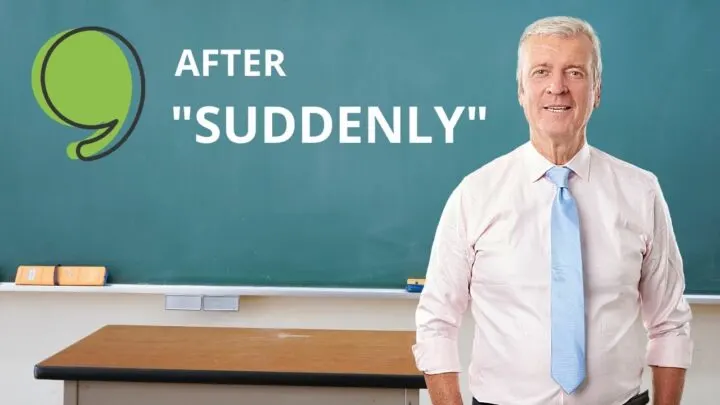There are too many other things to worry about in the world, so why even bother taking the time to learn the punctuation system, right?
Before I start discussing the nuances behind commas, I’d like to stress the point that having good writing skills could move mountains.
Not literally, of course, but writing is the only skill that every person with at least one hand could do and, thus, it makes everyone equal.
To understand how to punctuate the word “suddenly” with an after-comma properly, please read until the end of this post.
Should we put a comma after “suddenly?”
A comma is necessary after “suddenly” when it is used as an introductory sentence element as well as when it is used parenthetically. A parenthesis is a grammatically-irrelevant yet stylistically-important remark added to create emphasis, in which the emphatic effect can only be achieved by comma encapsulation. Also, a post-comma is needed when “suddenly” is used at the end of the first clause in either a compound or complex sentence, as long as the complex sentence starts with a dependent clause.
Understanding the meaning and function of “suddenly”
“Suddenly” is an adverb that works similarly with “immediately” which can be used to modify verbs, adjectives, or other adverbs.
In particular, “suddenly” is used to denote an occurrence of an activity or event that happens quickly and unexpectedly.
The use of “suddenly” in the example above means that an element of surprise is intended to be described.
Or, put simply, it is used to describe the sneaky and spooky act done by the subject in the example.
In another sense, it could also be used to refer to time bearing the meaning “sooner than what has been anticipated.”
Whether you are using “suddenly” to refer to time or manner, the rather stable meaning of the word generally does not create misinterpretation.
But, a misplaced comma certainly will. So, let us now talk about commas in more detail.
Placing a comma after “suddenly” in ample detail
Commas are generally used to organize messy ideas logically and cohesively, not to mention prosodically.
Although there seem to be too many rules and terms to consider when deciding on comma placement, punctuation skills can always be improved by constant writing.
As you keep writing, you won’t even have to think of the so-called “rules” anymore, which in the first place are not even set in stone.
Here’s a list of easy-to-follow guidelines on comma usage after the adverb “suddenly.”

When “suddenly” is used as an introductory element
A sentence’s introduction can be a word, phrase, a fragment, or even a clause that is normally set off with a post-comma placement.
A comma is important after introductory elements because they signal the readers to take a pause so that the initial context can be understood.
This means that a comma after “suddenly” is necessary when it is used as an introductory sentence element, especially in lengthy sentences.
In the sentence above, the comma after “suddenly” allows the reader to take a quick break before getting into the main idea.
Therefore, the comma also helps in making sentences more readable and easier to digest.
When “suddenly” is used in a compound sentence
A compound sentence is made up of two independent clauses linked by a coordinating conjunction, such as “and,” “but,” and “or.”
Good writers are keen on placing a comma before the conjunction as it marks the independence of each clause in the sentence.
This, therefore, implies that a post-comma should come after “suddenly” when it is used as the last word in the first clause in a compound sentence.
Here’s an example to demonstrate what has been explained.
It is easy to spot a compound sentence. Just look for a subject and a verb in each clause, as well as a coordinating conjunction from the FANBOYS’ club.
When “suddenly” is used in a complex sentence
A complex sentence is another type of sentence structure composed of at least one dependent and one independent clause.
These two clauses are tethered by subordinating conjunctions including that, unless, although, before, and because.
In creating complex sentences, we do not put a comma when the independent clause comes first.
However, a comma is necessary when the dependent clause starts the sentence off, which simply means having the conjunction as the first word.
Taking these things into consideration, we can automatically deduce that a complex sentence having “suddenly” as the last word in a frontal dependent clause does require a post-comma.
Here’s another example to represent the explanation.
Remember not to put a comma before “because” when reversing the order of the sentence, okay?
When “suddenly” is used in a parenthesis
The last case that necessitates a post-comma placement is when we use parenthetical interruptions.
A parenthesis is an idea or thought insertion aimed at providing extra details for emphatic reasons.
Parenthetical elements, therefore, play an important role in the process of persuasion because they make statements more interesting and non-monotonous.
Here’s an example to illustrate that.
The example above also makes use of the guideline explained in compound sentences earlier, combined with the parenthetical comma usage.
Parenthetical commas before and after “suddenly”
“Suddenly” may also be parenthetically inserted as a single-word remark within a sentence, in which doing so creates a more emphatic effect on the word per se.
Two commas are, thus, necessary in encapsulating “suddenly” in this type of sentence construction.
The commas above enable the reader to take a couple of breaks which then prompts the brain into the story-telling mode, rather than interpreting it as a formal statement.
No comma is needed after “suddenly”, when…
This section is a list of the considerations to take in not placing an after-comma to “suddenly.”
Bear in mind that the instances below do not meet any of the criteria on comma placement elaborated earlier.
We must not place a post-comma when “suddenly” functions as an ordinary adverb whose job is to modify verbs, adjectives, and other adverbs.
These cases, again, should not meet any of the criteria mentioned such as an introductory element, compound or complex sentence forms, and parentheses.
And, albeit possible to insert one, comma non-placement is often observed in statements using “suddenly” that contains very weak interrupting power.
Let’s take a closer look at each one.
When “suddenly” modifies a verb
The main task of adverbs of manners like “suddenly” is to modify actions or verbs in a sentence.
When this happens, putting a comma makes the sentence confusing and grammatically-awkward.
Here’s the correct way of modifying a verb with “suddenly.”
As an adverb of manner, the modifying focus of “suddenly” is directed to the verb, providing the meaning that the act of crying unexpectedly occurred.
When“suddenly” modifies an adjective
Another function of adverbs is to modify adjectives, which is also possible with “suddenly.”
When “suddenly” functions this way, it means that the speaker or writer intends to draw more emphasis on the adjective, as opposed to the other sentence elements.
Although this structure is possible in informal conversations, it is still much better to use “suddenly” as a verb modifier.
So, please refrain from structuring the sentence as in the last example, and, of course, never include a comma at all.
When “suddenly” is modified by an adverb
Thirdly, “suddenly” may also be pre-modified by an intensifying adverb in a sentence.
Adverbs of intensity are used to increase the richness of the intended message which influences how the listener or reader interprets the information.
The sentence below shows the structure of an intensifying adverb modifying another adverb.
Since the modification process is done adjacently, there’s no need to place any commas at all.
And, obviously enough, putting a comma instead of a period after “suddenly” in the last example makes the sentence incorrect.
A comma after “suddenly” is optional, when…
In some cases, you may decide if you want to place a comma after suddenly or not. As far as “suddenly” goes, this holds true when suddenly causes a weak interruption.
When “suddenly” causes a weak interruption
The last case wherein the post-comma is not necessarily that crucial, but still optional, is when “suddenly” creates a soft or weak interruption.
This may apply when suddenly is used at the beginning of a sentence, making it an introductory element.
Particularly, this can be conveniently done when chances of misinterpretation are low, as well as when the comma likely disrupts the rhythm of a relatively short statement.
Again, the post-comma placement is only optional in this case, and therefore, the overall context and the flow of ideas in longer texts should still be considered.
Frequently Asked Questions on Comma After “Suddenly”
What is exactly meant by “suddenly?”
“Suddenly” denotes the meaning “all of a sudden” or “immediately and unexpectedly.” We use this term when we want to express an element of surprise in our statement. For example, “The police suddenly arrived.”
What part of speech does “suddenly” belong?
It is an adverb used to modify verbs in general, which means it mostly functions as an adverb of manner in sentences. “Suddenly” also denotes the meaning “sooner than expected,” and thus, it may also be classified as an adverb of time depending on the context.
Can we put a comma after “eventually” at the beginning of the sentence?
A comma is generally necessary when using “eventually” at the beginning of the sentence. “Eventually” is an adverbial connector that has a similar meaning to “in the end” which is often used as an introductory element because of its summative function. The comma may be conveniently removed when the interruption is too weak to create misinterpretation.
Conclusion
A language is an integral and powerful tool that human beings utilize to keep civilization going.
Hence, as humans, we ought to take good care of even the most minute linguistic aspects such as the punctuation system.
Punctuation marks have been developed for a reason: to disambiguate utterances and written statements so we can communicate better.
When our communication process is smooth-sailing, we can then easily create solutions to other world problems that we deem as more crucial.

Hey fellow Linguaholics! It’s me, Marcel. I am the proud owner of linguaholic.com. Languages have always been my passion and I have studied Linguistics, Computational Linguistics and Sinology at the University of Zurich. It is my utmost pleasure to share with all of you guys what I know about languages and linguistics in general.

